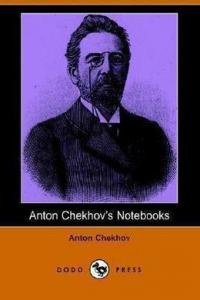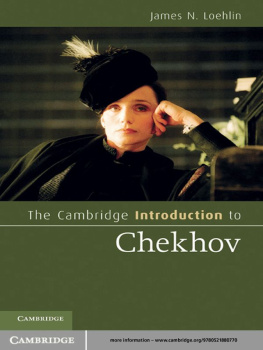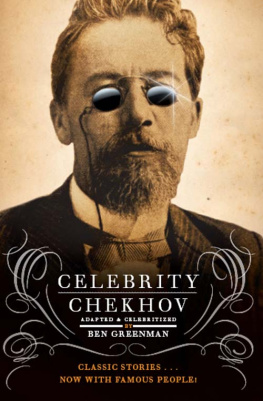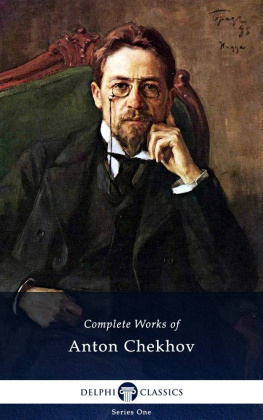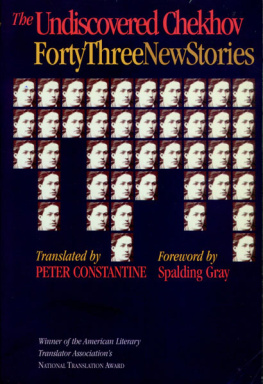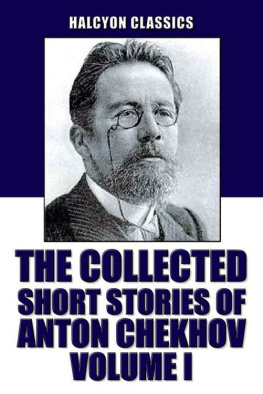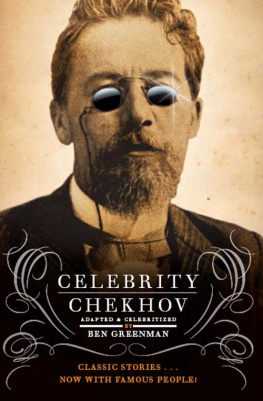Project Gutenberg's The Lady with the Dog and Other Stories, by Anton Chekhov
This eBook is for the use of anyone anywhere at no cost and withalmost no restrictions whatsoever. You may copy it, give it away orre-use it under the terms of the Project Gutenberg License includedwith this eBook or online at www.gutenberg.net
Title: The Lady with the Dog and Other Stories
Author: Anton Chekhov
Release Date: September 9, 2004 [EBook #13415]
Language: English
*** START OF THIS PROJECT GUTENBERG EBOOK LADY WITH DOG ***
Produced by James Rusk
THE TALES OF CHEKHOV
VOLUME 3
THE LADY WITH THE DOG AND OTHER STORIES
BY
ANTON TCHEKHOV
Translated by CONSTANCE GARNETT
CONTENTS
THE LADY WITH THE DOGA DOCTOR'S VISITAN UPHEAVALIONITCHTHE HEAD OF THE FAMILYTHE BLACK MONKVOLODYAAN ANONYMOUS STORYTHE HUSBAND
THE LADY WITH THE DOG
I
IT was said that a new person had appeared on the sea-front: a ladywith a little dog. Dmitri Dmitritch Gurov, who had by then been afortnight at Yalta, and so was fairly at home there, had begun totake an interest in new arrivals. Sitting in Verney's pavilion, hesaw, walking on the sea-front, a fair-haired young lady of mediumheight, wearing a bret; a white Pomeranian dog was running behindher.
And afterwards he met her in the public gardens and in the squareseveral times a day. She was walking alone, always wearing the samebret, and always with the same white dog; no one knew who shewas, and every one called her simply "the lady with the dog."
"If she is here alone without a husband or friends, it wouldn't beamiss to make her acquaintance," Gurov reflected.
He was under forty, but he had a daughter already twelve years old,and two sons at school. He had been married young, when he was astudent in his second year, and by now his wife seemed half as oldagain as he. She was a tall, erect woman with dark eyebrows, staidand dignified, and, as she said of herself, intellectual. She reada great deal, used phonetic spelling, called her husband, not Dmitri,but Dimitri, and he secretly considered her unintelligent, narrow,inelegant, was afraid of her, and did not like to be at home. Hehad begun being unfaithful to her long agohad been unfaithfulto her often, and, probably on that account, almost always spokeill of women, and when they were talked about in his presence, usedto call them "the lower race."
It seemed to him that he had been so schooled by bitter experiencethat he might call them what he liked, and yet he could not get onfor two days together without "the lower race." In the society ofmen he was bored and not himself, with them he was cold anduncommunicative; but when he was in the company of women he feltfree, and knew what to say to them and how to behave; and he wasat ease with them even when he was silent. In his appearance, inhis character, in his whole nature, there was something attractiveand elusive which allured women and disposed them in his favour;he knew that, and some force seemed to draw him, too, to them.
Experience often repeated, truly bitter experience, had taught himlong ago that with decent people, especially Moscow peoplealwaysslow to move and irresoluteevery intimacy, which at first soagreeably diversifies life and appears a light and charming adventure,inevitably grows into a regular problem of extreme intricacy, andin the long run the situation becomes unbearable. But at every freshmeeting with an interesting woman this experience seemed to slipout of his memory, and he was eager for life, and everything seemedsimple and amusing.
One evening he was dining in the gardens, and the lady in the bretcame up slowly to take the next table. Her expression, her gait,her dress, and the way she did her hair told him that she was alady, that she was married, that she was in Yalta for the firsttime and alone, and that she was dull there.... The stories toldof the immorality in such places as Yalta are to a great extentuntrue; he despised them, and knew that such stories were for themost part made up by persons who would themselves have been gladto sin if they had been able; but when the lady sat down at thenext table three paces from him, he remembered these tales of easyconquests, of trips to the mountains, and the tempting thought ofa swift, fleeting love affair, a romance with an unknown woman,whose name he did not know, suddenly took possession of him.
He beckoned coaxingly to the Pomeranian, and when the dog came upto him he shook his finger at it. The Pomeranian growled: Gurovshook his finger at it again.
The lady looked at him and at once dropped her eyes.
"He doesn't bite," she said, and blushed.
"May I give him a bone?" he asked; and when she nodded he askedcourteously, "Have you been long in Yalta?"
"Five days."
"And I have already dragged out a fortnight here."
There was a brief silence.
"Time goes fast, and yet it is so dull here!" she said, not lookingat him.
"That's only the fashion to say it is dull here. A provincial willlive in Belyov or Zhidra and not be dull, and when he comes hereit's 'Oh, the dulness! Oh, the dust!' One would think he came fromGrenada."
She laughed. Then both continued eating in silence, like strangers,but after dinner they walked side by side; and there sprang upbetween them the light jesting conversation of people who are freeand satisfied, to whom it does not matter where they go or whatthey talk about. They walked and talked of the strange light on thesea: the water was of a soft warm lilac hue, and there was a goldenstreak from the moon upon it. They talked of how sultry it was aftera hot day. Gurov told her that he came from Moscow, that he hadtaken his degree in Arts, but had a post in a bank; that he hadtrained as an opera-singer, but had given it up, that he owned twohouses in Moscow.... And from her he learnt that she had grownup in Petersburg, but had lived in S since her marriage twoyears before, that she was staying another month in Yalta, and thather husband, who needed a holiday too, might perhaps come and fetchher. She was not sure whether her husband had a post in a CrownDepartment or under the Provincial Counciland was amused by herown ignorance. And Gurov learnt, too, that she was called AnnaSergeyevna.
Afterwards he thought about her in his room at the hotelthoughtshe would certainly meet him next day; it would be sure to happen.As he got into bed he thought how lately she had been a girl atschool, doing lessons like his own daughter; he recalled thediffidence, the angularity, that was still manifest in her laughand her manner of talking with a stranger. This must have been thefirst time in her life she had been alone in surroundings in whichshe was followed, looked at, and spoken to merely from a secretmotive which she could hardly fail to guess. He recalled her slender,delicate neck, her lovely grey eyes.
"There's something pathetic about her, anyway," he thought, andfell asleep.
II
A week had passed since they had made acquaintance. It was a holiday.It was sultry indoors, while in the street the wind whirled thedust round and round, and blew people's hats off. It was a thirstyday, and Gurov often went into the pavilion, and pressed AnnaSergeyevna to have syrup and water or an ice. One did not know whatto do with oneself.
In the evening when the wind had dropped a little, they went outon the groyne to see the steamer come in. There were a great manypeople walking about the harbour; they had gathered to welcome someone, bringing bouquets. And two peculiarities of a well-dressedYalta crowd were very conspicuous: the elderly ladies were dressedlike young ones, and there were great numbers of generals.
Next page


